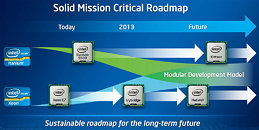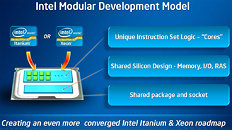Friday, November 9th 2012

Future Itanium and Xeon Processors Socket-Intercompatible
In what could be the very first time two different machine architectures share a platform, future versions of Intel's Xeon and Itanium processors could be socket-compatible. Intel Itanium is based on the Itanium64 (IA64) machine architecture, while Xeon is x86-64 based. Intel plans to implement its common platform strategy with the next generation models of the two, that's "Kittson" Itanium, and "Haswell" Xeon.
This level of convergence could make it easier for companies to deploy select amounts of Itanium and Xeon processors in their data-centers, to suit specific tasks, and save money on buying common platforms for both. Itanium processors are typically preferred for in mission-critical environments, where there's close to zero margin for error (think military, medical, and space-exploration); while Xeon is good at handling heavy serial processing loads (think servers, database management, cloud). Introduction of the converged platform is expected in the 2013-2015 time range, using Xeon "Haswell" launch as a point of reference.
Source:
X-bit Labs
This level of convergence could make it easier for companies to deploy select amounts of Itanium and Xeon processors in their data-centers, to suit specific tasks, and save money on buying common platforms for both. Itanium processors are typically preferred for in mission-critical environments, where there's close to zero margin for error (think military, medical, and space-exploration); while Xeon is good at handling heavy serial processing loads (think servers, database management, cloud). Introduction of the converged platform is expected in the 2013-2015 time range, using Xeon "Haswell" launch as a point of reference.


44 Comments on Future Itanium and Xeon Processors Socket-Intercompatible
They have AS/400 systems with more up time than Itanium chips have been around. Itanium REQUIRES new software to be written, its slow, very specific application, and is only still around due to HP PAYING Intel to keep it that way.
I didn't say anything other than you have not provided anything other than your own sayings.
First, Oracle was dumping Itanium, and HP and Intel sued them.
www.zdnet.com/oracle-will-support-hp-itanium-systems-can-fud-damage-be-reversed-7000003770/
www.businessinsider.com/hp-shows-off-new-itanium-servers-2012-11
Now that we have that cleared up lets move on to.
Intel promised another architecture by now that fixes the heat, power consumption and performance issues and this chip has and is already late. Now they are saying Xeon will be more than capable of what Itanium is doing now.
HP PAID Intel almost 700 MILLION dollars to keep making Itanium so their artificially created hardware niche will survive.
AS/400 is a generic term, how about Zseries servers, that kick the shit out of Itanium systems by at least a factor of 2 and in many applications closer to 6? The issues that IBM and user face is the lengthy process to become a certified tech, and once you are companies want you to have experience. But the pay is amazing, a friend makes well into 6 figures to babysit two tandem servers that some hospitals in south Florida use.
So in short, the Itanic is going away, Xeon, and Knights corner are on the way in.
www.google.com
Just in case some didn't know how to find any information that wasn't in PDF form, I will caution you, there might be some truthful information that doesn't match up with your reality, and it may cause you to think instead of just spewing what you have read as the only truth.
lovehate triangle. No wonder all this Itanium stuff is being released out of the blue. Intel/HP wants to prove to Oracle/judge that Itanium is still relevant.Looking into the Itanium architecture, it is apparent based on it's design, that it was designed for WORKSTATION use. It has an ENORMOUS number of fast extended precision floating point registers with 84-bit precision... more than x87 (80bit) and more than SSE (64bit). It has 128 FP registers, and a float stack. It can do incredibly complex and convoluted maths calculations, permutations, etc. without loss of interim accuracy before committing results to memory. With 128 FP registers it is 16x as many as the x87, the "maths" part of your regular x86 CPU. It is faster and more accurate on calculations. It was designed as a scientific microprocessor. You do not need floating point in data centers.
BTW, anyone remember the x487 bug? FP bugs in Pentium 4. Was that spotted by a human, or did the computer tell us all by itself?! LOL.
If Itanium is being used for transactional data and data centre, rather than data crunching research, it is a historical consequence of politics and/or ignorance, not feature set of the processor. It is hardly surprising that for most Oracle implementations, it is not optimal.
What has also become clear from legal documents made open by court proceedings, is that HP has paid Intel $690 million to continue to support and develop the Itanium processor. The whole Itanium R&D, and PR budget, has essentially been paid for by HP. The reasons that HP has done this is beyond our knowledge. I would suspect DARPA contracts where HP has signed up for 10 year+ projects with DARPA. If Intel dropped Itanium, then HP would default on these contracts, with obvious consequences.
Itanium is somewhat behind on legacy I/O due to having to design Itanium compatible chipsets. When new I/O is released, it is time consuming and expensive to design new chipsets to provide this I/O.
So Intel will now put the "Itanium core" the same Xeon package and be able to use the same supporint i/o chipsets. Good idea to save costs. What does it mean? That the i/o end will have the same functionality (security, data correction, EEC) as a Xeon based system.
Edit: These new "modular" chips with Xeon and Itanium shared could find their way in to workstations but prior to this, they weren't intended for workstations at all.
Anyway I don't see the problem with HP paying for Itanium development. If anything that juse proves there's a niche for it (as opposed to a glorious mass market gangbang).
Look at Steevo's PDF. Itanium 2 is the fasted GFLOPS per MHz. And that was Itanium 2, not the current Itanium 9300 (Tukwila: 2010) which would probably do even better.
Not that you CANT use it for enterprise servers. But it was not DESIGNED as an enterprise server. This is one of the problems with Oracle. Crap performance.
Quoting from wiki (I know not the best source) "During development, Intel, HP, and industry analysts predicted that IA-64 would dominate in servers, workstations, and high-end desktops". NEVER TARGETED at mainframe data transaction processing.
Remember that Itanium WAS THE 64-BIT processor to replace x86. Or intended to be. And a way for Intel to cut out all x86 licensees from 64bit. But AMD did their AMD64 extensions to x86 and quickly 64bit was possible in the regular commercial/consumer CPU space. Then Intel has to license AMD64 for THEIR x86 CPUs!
I agree with you, HP is paying for a chip they need and want to use. It's as simple as that and I don't see anything wrong with it. Economics will destroy Itanium if there is no market for it - which is clearly not the case atm.
"But for some HP scientists, the product launch -- a workstation and two servers -- marks the culmination of research...These processors are intended for dynamic Internet-based interactions, complex computations, rich media processing and object- oriented environments."